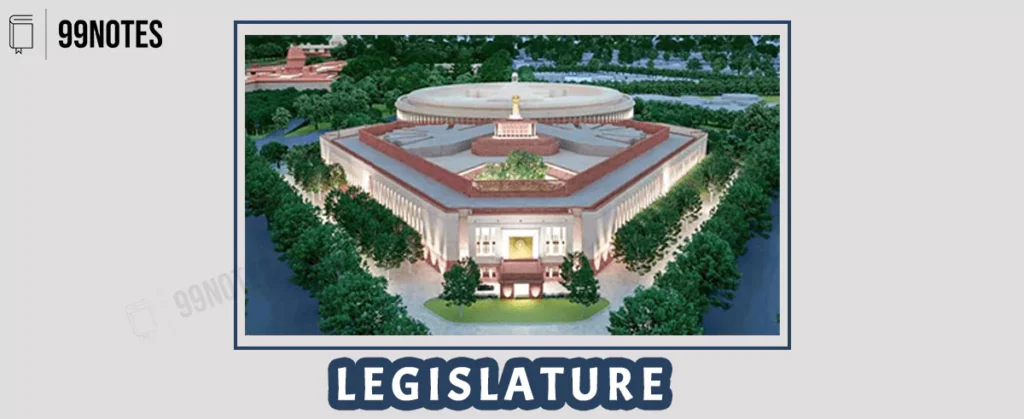
Legislature Free UPSC Notes Download
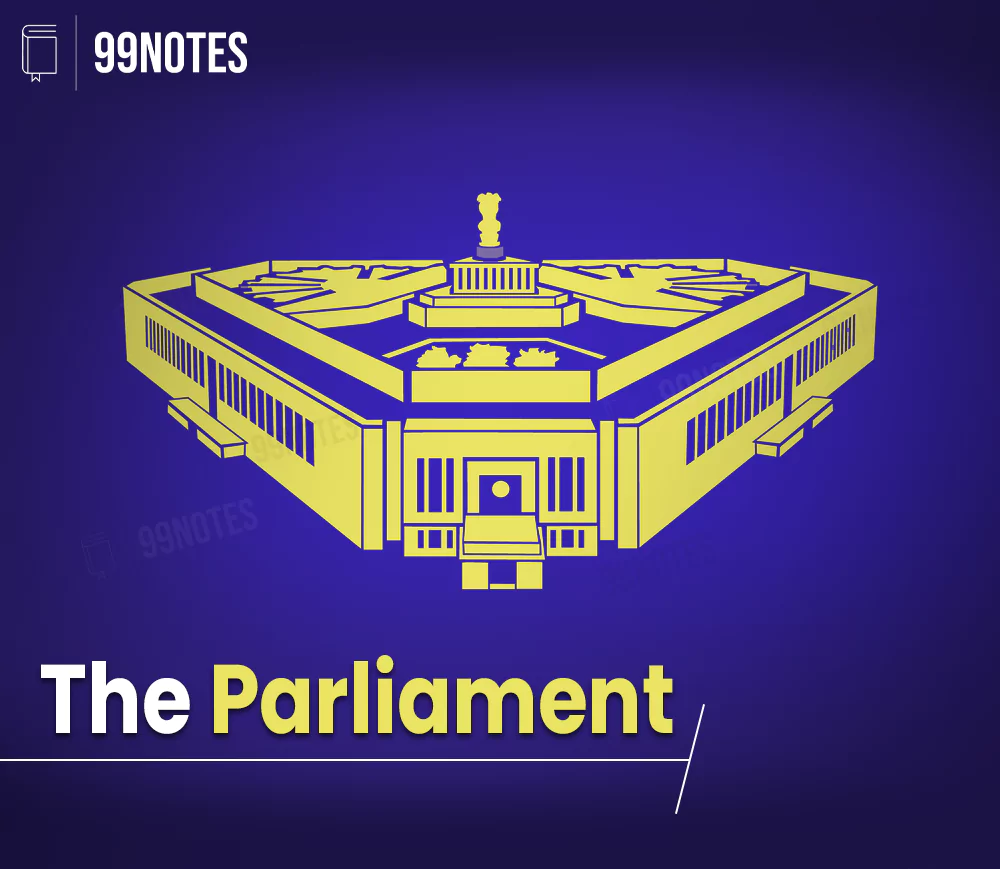
1. The Parliament
The Union Legislature in the Indian Constitutional set-up is known as the Indian Parliament. It is modelled after the British Parliament, wherein the Executive is collectively responsible to the Parliament. This is known as the Parliamentary form of government.
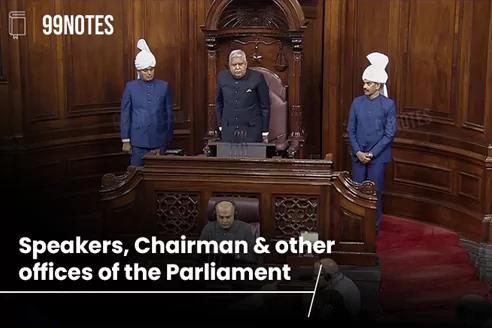
2. Speakers, Chairman and other offices of the Parliament
Both houses of the Parliament have a presiding officer; the Lok Sabha has a Speaker as the principal presiding officer and a deputy speaker to assist him/her and preside over the chair in his/her absence.
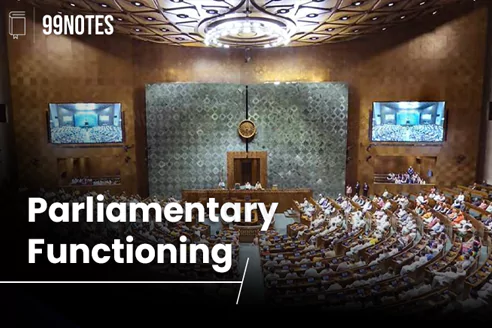
3. Parliamentary Functioning
In order to perform its role efficiently, various mechanisms have been set up in the Constitution, and each House has been empowered to make its own rule under Article 118. Rules of communication between both houses and the Joint sitting are made by the President after consultation with the Speaker of Lok Sabha and the Chairman of Rajya Sabha.
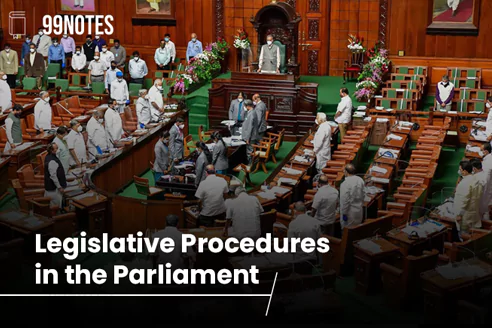
4. Legislative Procedures in the Parliament
Parliament being the supreme legislative body in the country, its primary function is law-making. All legislative proposals in Parliament are brought in the form of bills. A Bill is a draft statute and cannot become act or law unless it has received the approval of both the Houses and the assent of the President. .
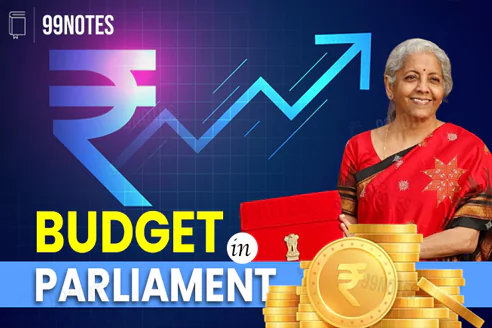
5 . Budget in Parliament
The Budget is an annual financial statement giving an account of the expected revenue and expenditure of public money in a financial year, which starts on 1st April and ends on 31st March. It is a work plan that gives direction to the implementation of policies and programmes.
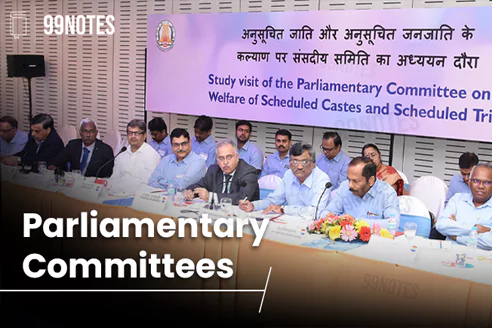
6. Parliamentary Committees
Members of Parliament need help to understand the complexity of the bills introduced in the House. Additionally, Parliament do not have enough time as they meet thrice a year, that too with a limited number of days there comes the role of parliamentary committees.
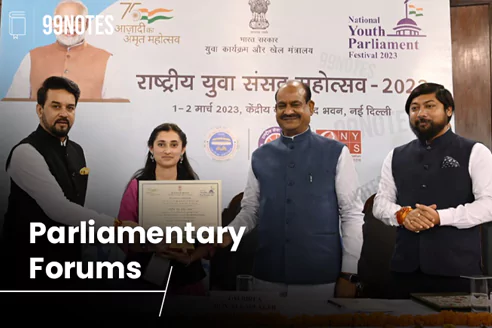
7. Parliamentary Forums
The Indian Parliament actively engages with the Indian and the world forums in order to share experiences and enhance Participation. In this context, the Indian Parliamentary Group (IPG) and the Youth Parliament have emerged as important associations..
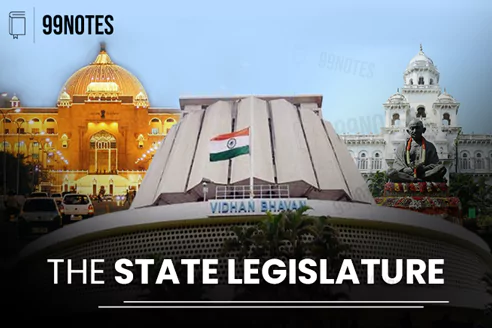
8. The State Legislature
In India, the Constitution makers adopted a parliamentary form of government at the state and union levels. According to former President KR Narayanan, “Parliament and legislatures constitute the head and front of the body-politics in India.
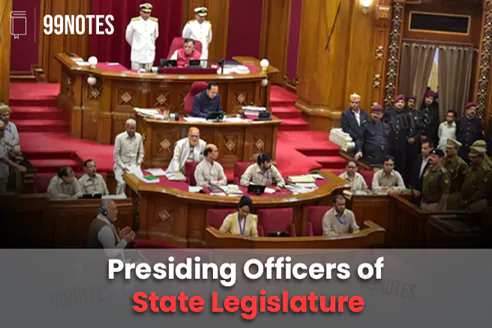
9. Presiding Officers of State Legislature
Both houses of the state legislature have a presiding officer; the state assembly has a Speaker as the principal presiding officer and a deputy speaker to assist them and preside over the chair in their absence. Similarly, the legislative Council (in the case of a bicameral legislature is presided over by the Chairman (Chairperson) and assisted by the deputy chairperson.
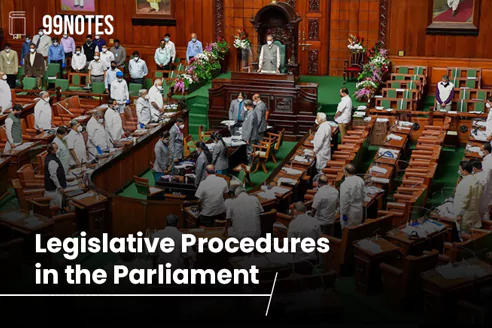
10. Legislative Procedures in the State Legislature
The legislative procedure in the state legislature is somewhat similar to the procedure in the Parliament; however, since the Legislative Council has much fewer powers as compared to the Rajya Sabha, there are some differences in the legislative procedure in the state legislature, which we will discuss here:
- Legislature Free UPSC Notes Download
- 1. The Parliament
- 2. Speakers, Chairman and other offices of the Parliament
- 3. Parliamentary Functioning
- 4. Legislative Procedures in the Parliament
- 5 . Budget in Parliament
- 6. Parliamentary Committees
- 7. Parliamentary Forums
- 8. The State Legislature
- 9. Presiding Officers of State Legislature
- 10. Legislative Procedures in the State Legislature
- Other Related Links:
- Other Related Links:
- More About Legislature

More About Legislature
Reading about the legislature is an important topic for the UPSC Civil Services Exam (CSE) because the legislature is one of the three organs of the government of India, along with the executive and the judiciary. The legislature is responsible for making laws for the country and represents the will of the people.
In the Indian political system, the legislature is made up of the Parliament, which consists of the President and two houses: The Council of States (Rajya Sabha) and the House of the People (Lok Sabha). The Parliament has the power to make laws for the entire country and to levy taxes.
The UPSC CSE is a competitive examination that tests candidates on their knowledge of a wide range of topics, including Indian history, geography, economics, and current affairs. The functioning of the legislature and the role of the Parliament in the governance of the country are important aspects of the exam syllabus.
In the UPSC CSE, questions on the legislature and the Parliament may be asked in the general studies paper as well as in the optional subjects. It is therefore important for candidates to have a good understanding of the structure and function of the legislature and the Parliament, and to be able to apply their knowledge to real-life situations.
The Council of States, or the Rajya Sabha, is the upper house of the Parliament and consists of 250 members. It represents the states of the Union and the Union Territories, and its members are elected by the state and territorial legislatures. The Vice President of India is the ex-officio Chairman of the Rajya Sabha.
The House of the People, or the Lok Sabha, is the lower house of the Parliament and consists of 543 elected members. The Speaker of the Lok Sabha presides over its proceedings.
The Parliament has the power to make laws for the entire country and to levy taxes. It also has the power to impeach the President and to remove the judges of the Supreme Court and the high courts for misbehavior or incapacity.
The President of India is a ceremonial head of state, but has some important powers and functions. The President has the power to appoint the Prime Minister and other ministers, and to summon and prorogue the sessions of the Parliament. The President can also dissolve the Lok Sabha and call for fresh elections.
The Prime Minister is the head of the government and is appointed by the President on the advice of the majority in the Lok Sabha. The Prime Minister leads the Council of Ministers, which consists of the ministers in charge of various portfolios. The Council of Ministers is responsible for the administration of the government and is accountable to the Parliament.
The Parliament has the power to make laws on a wide range of subjects listed in the Seventh Schedule of the Constitution.
These subjects are divided into three lists: the Union List, the State List, and the Concurrent List. The Union List consists of subjects that are of national importance and are within the exclusive jurisdiction of the Union government.
- The State List consists of subjects that are of local or state importance and are within the jurisdiction of the state governments.
- The Concurrent List consists of subjects on which both the Union and the state governments have the power to legislate.
The Parliament also has the power to approve the budget and to control the finances of the government. It has the power to scrutinize the conduct of the government and to hold it accountable through various means such as debates, question hour, and committees.
In summary, the legislature is an important organ of the government of India and plays a crucial role in the governance of the country. It is responsible for making laws and representing the will of the people.
The Parliament, which consists of the President and two houses, has the power to make laws for the entire country and to levy taxes. The UPSC CSE tests candidates on their knowledge of the legislature and the Parliament, and it is therefore important for candidates to have a good understanding of its structure and function.
